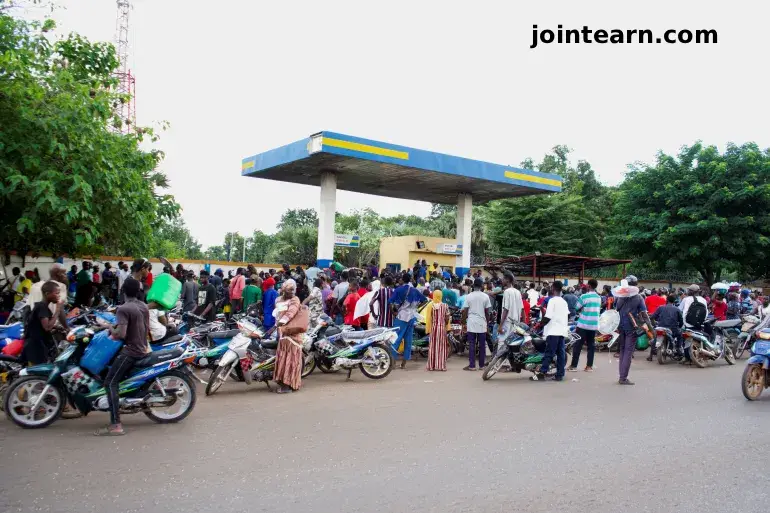
The West African nation of Mali is facing one of its most severe crises in years as a fuel blockade imposed by an al-Qaeda-affiliated armed group chokes the capital Bamako, sparking widespread shortages, soaring prices, and mounting public anger at the ruling military junta.
According to Al Jazeera correspondent Nicolas Haque, the Jama’at Nusrat al-Islam wal-Muslimin (JNIM) group—linked to al-Qaeda—has been blocking routes used by fuel tankers for more than a month, effectively cutting off vital energy supplies to the capital. The blockade has pushed fuel prices up by 500 percent, from about $25 to $130 per litre, bringing much of the city’s transportation and commerce to a standstill.
US Embassy Warns Citizens to Leave Mali Immediately
As conditions deteriorate, the US Embassy in Mali issued an urgent security alert on Tuesday, advising American citizens to “depart immediately” using commercial flights. The embassy warned that the fuel blockade had made daily life increasingly dangerous and that overland travel carried a heightened risk of terrorist attacks.
“The situation in Mali remains unpredictable. US citizens should not attempt to travel by road to neighboring countries due to the high threat of attacks along national highways,” the embassy statement read.
The embassy urged those who remain in Mali to prepare emergency plans, including provisions for extended shelter-in-place scenarios, as the country grapples with worsening insecurity and fuel shortages.
Public Anger Mounts in Bamako
In Bamako, long queues have formed outside the few petrol stations that remain operational. Many residents have resorted to walking long distances or using makeshift transport options as fuel supplies dwindle.
“Before, we could buy gas everywhere in cans. But now there’s no more,” said Bakary Coulibaly, a fuel reseller. “Even at the stations, it’s not certain there will be gasoline available.”
Omar Sidibé, a frustrated driver, told Al Jazeera that the government must act urgently:
“It’s up to the government to take responsibility and uncover the real reason behind this shortage.”
According to Haque, JNIM fighters have been burning fuel trucks and attacking transport routes to tighten the blockade. The group claims the action is retaliation for the military government’s ban on fuel sales in rural areas, which authorities imposed to prevent supplies from reaching armed fighters.
Schools Closed, Flights Cancelled
The fuel crisis has paralyzed multiple sectors of daily life. Schools and universities have been closed for more than two weeks, while airlines are cancelling flights due to operational challenges and security risks.
The government continues to insist that “everything is under control”, but citizens and observers say the situation is spiraling beyond the state’s capacity to manage.
“The junta’s denial contrasts sharply with the reality in Bamako, where frustration and fear are rising,” said a political analyst based in Dakar.
Regional Fallout: Fuel Trucks Stranded in Senegal
At fuel depots near Senegal’s border with Mali, truck drivers have been stranded for weeks. Some are reportedly paying off JNIM fighters to allow safe passage through conflict zones.
“They’ve been waiting not days, but months, their tanks empty,” Haque reported from Dakar. “Ahead of them lies a dangerous road through al-Qaeda-held territory.”
This prolonged standoff has disrupted not only Mali’s domestic supply chain but also regional trade routes across the Sahel, threatening broader economic stability.
JNIM’s Expanding Influence and Mali’s Deepening Isolation
Jama’at Nusrat al-Islam wal-Muslimin (JNIM), which formed in 2017, is a coalition of several jihadist factions operating across the Sahel region. The group has intensified attacks on government forces, infrastructure, and civilians as Mali’s military struggles to maintain control following the 2020 coup.
Under the junta, Mali has cut ties with France, expelled UN peacekeeping forces, and aligned more closely with Russia’s Wagner Group. Despite promises to restore security, violence has spread into previously stable areas.
According to Human Rights Watch, the conflict has resulted in thousands of deaths and displaced over 350,000 people.
Growing Humanitarian and Political Crisis
As fuel supplies vanish and prices soar, essential services like public transportation, hospitals, and food distribution are facing severe disruptions. Power outages are becoming more frequent as generators run dry.
Humanitarian groups warn that the blockade could trigger a broader crisis, exacerbating poverty and insecurity in a country already on edge from years of conflict and economic instability.
“This is not just a fuel shortage; it’s a siege,” said a local NGO representative. “People can’t move, trade, or even access medical care.”
With the US Embassy’s evacuation alert, growing public dissent, and armed groups tightening control over transport corridors, analysts say Mali’s military government faces its most serious legitimacy test yet.
Outlook: Rising Unrest, Shrinking Options
While the junta insists it has “everything under control,” ordinary Malians are losing faith. The crisis underscores the fragility of state power in a country where armed groups dominate rural areas and the government’s authority extends little beyond Bamako.
If the blockade continues, experts warn of potential civil unrest, economic collapse, and further regional destabilization in the already volatile Sahel.
“Mali is on the edge of a humanitarian and political precipice,” said an analyst with the West Africa Policy Institute. “Without international engagement and a coherent security strategy, the crisis could soon spiral beyond containment.”


Leave a Reply